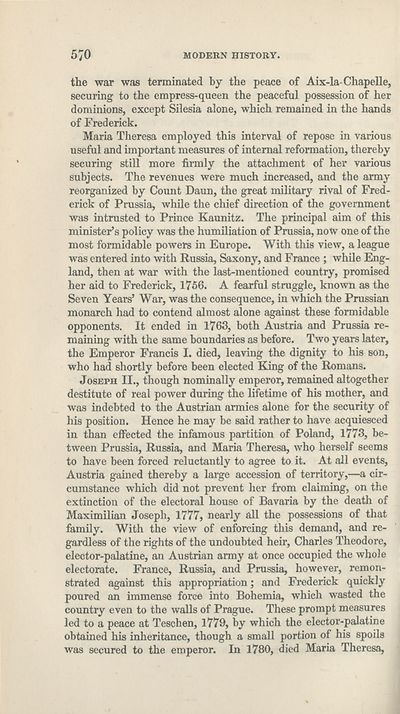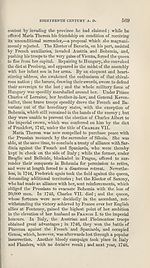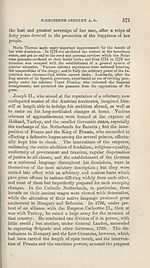Download files
Complete book:
Individual page:
Thumbnail gallery: Grid view | List view

570
MODERN HISTORY.
the war was terminated by the peace of Aix-la Chapelle,
securing to the empress-queen the peaceful possession of her
dominions, except Silesia alone, which remained in the hands
of Frederick.
Maria Theresa employed this interval of repose in various
useful and important measures of internal reformation, thereby
securing still more firmly the attachment of her various
subjects. The revenues were much increased, and the army
reorganized by Count Daun, the great military rival of Fred¬
erick of Prussia, while the chief direction of the government
was intrusted to Prince Kaunitz. The principal aim of this
minister’s policy was the humiliation of Prussia, now one of the
most formidable powers in Europe. With this view, a league
was entered into with Russia, Saxony, and France ; while Eng¬
land, then at war with the last-mentioned country, promised
her aid to Frederick, 1756. A fearful struggle, known as the
Seven Years’ War, was the consequence, in which the Prussian
monarch had to contend almost alone against these formidable
opponents. It ended in 1763, both Austria and Prussia re¬
maining with the same boundaries as before. Two years later,
the Emperor Francis I. died, leaving the dignity to his son,
who had shortly before been elected King of the Romans.
Joseph II., though nominally emperor, remained altogether
destitute of real power during the lifetime of his mother, and
was indebted to the Austrian armies alone for the security of
his position. Hence he may be said rather to have acquiesced
in than effected the infamous partition of Poland, 1773, be¬
tween Prussia, Russia, and Maria Theresa, who herself seems
to have been forced reluctantly to agree to it. At all events,
Austria gained thereby a large accession of territory,—a cir¬
cumstance which did not prevent her from claiming, on the
extinction of the electoral house of Bavaria by the death of
Maximilian Joseph, 1777, nearly all the possessions of that
family. With the view of enforcing this demand, and re¬
gardless of the rights of the undoubted heir, Charles Theodore,
elector-palatine, an Austrian army at once occupied the whole
electorate. France, Russia, and Prussia, however, remon¬
strated against this appropriation; and Frederick quickly
poured an immense force into Bohemia, which wasted the
country even to the walls of Prague. These prompt measures
led to a peace at Teschen, 1779, by which the elector-palatine
obtained his inheritance, though a small portion of his spoils
was secured to the emperor. In 1780, died Maria Theresa,
MODERN HISTORY.
the war was terminated by the peace of Aix-la Chapelle,
securing to the empress-queen the peaceful possession of her
dominions, except Silesia alone, which remained in the hands
of Frederick.
Maria Theresa employed this interval of repose in various
useful and important measures of internal reformation, thereby
securing still more firmly the attachment of her various
subjects. The revenues were much increased, and the army
reorganized by Count Daun, the great military rival of Fred¬
erick of Prussia, while the chief direction of the government
was intrusted to Prince Kaunitz. The principal aim of this
minister’s policy was the humiliation of Prussia, now one of the
most formidable powers in Europe. With this view, a league
was entered into with Russia, Saxony, and France ; while Eng¬
land, then at war with the last-mentioned country, promised
her aid to Frederick, 1756. A fearful struggle, known as the
Seven Years’ War, was the consequence, in which the Prussian
monarch had to contend almost alone against these formidable
opponents. It ended in 1763, both Austria and Prussia re¬
maining with the same boundaries as before. Two years later,
the Emperor Francis I. died, leaving the dignity to his son,
who had shortly before been elected King of the Romans.
Joseph II., though nominally emperor, remained altogether
destitute of real power during the lifetime of his mother, and
was indebted to the Austrian armies alone for the security of
his position. Hence he may be said rather to have acquiesced
in than effected the infamous partition of Poland, 1773, be¬
tween Prussia, Russia, and Maria Theresa, who herself seems
to have been forced reluctantly to agree to it. At all events,
Austria gained thereby a large accession of territory,—a cir¬
cumstance which did not prevent her from claiming, on the
extinction of the electoral house of Bavaria by the death of
Maximilian Joseph, 1777, nearly all the possessions of that
family. With the view of enforcing this demand, and re¬
gardless of the rights of the undoubted heir, Charles Theodore,
elector-palatine, an Austrian army at once occupied the whole
electorate. France, Russia, and Prussia, however, remon¬
strated against this appropriation; and Frederick quickly
poured an immense force into Bohemia, which wasted the
country even to the walls of Prague. These prompt measures
led to a peace at Teschen, 1779, by which the elector-palatine
obtained his inheritance, though a small portion of his spoils
was secured to the emperor. In 1780, died Maria Theresa,
Set display mode to:
![]() Universal Viewer |
Universal Viewer | ![]() Mirador |
Large image | Transcription
Mirador |
Large image | Transcription
| Antiquarian books of Scotland > Education > Elements of universal history on a new and systematic plan > (590) |
|---|
| Permanent URL | https://digital.nls.uk/127587220 |
|---|
| Description | Thousands of printed books from the Antiquarian Books of Scotland collection which dates from 1641 to the 1980s. The collection consists of 14,800 books which were published in Scotland or have a Scottish connection, e.g. through the author, printer or owner. Subjects covered include sport, education, diseases, adventure, occupations, Jacobites, politics and religion. Among the 29 languages represented are English, Gaelic, Italian, French, Russian and Swedish. |
|---|

